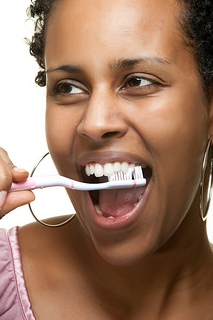What to do about Dry Mouth
October 20th, 2021

Xerostomia, commonly known as dry mouth, is a condition in which the salivary glands in the mouth don’t produce enough saliva. Saliva keeps the mouth moist and cleanses it of bacteria. A lack of it makes for an uncomfortably dry mouth that is also more susceptible to infection and disease.
Symptoms of dry mouth include:
- Dryness or a sticky feeling
- Frequent thirst
- Burning sensations or redness in the throat or on the tongue
- A sore throat or hoarseness
- Difficulty chewing, swallowing, or tasting food
Dry mouth usually comes about as a side effect of certain medications or medical conditions, but can also be caused by damage to the salivary glands because of injury or surgery.
If you're experiencing any of the symptoms of dry mouth, here are a few tips for what to do:
Double-check medications: If you are taking any prescription or over-the-counter medications, speak with Drs. Peter Vogel, Vijal Vadecha to see if any of these could be causing the dry mouth as a side effect.
There may be ways to alleviate the symptoms.
- Stay hydrated: Whether you have dry mouth or not, it’s essential to stay hydrated. Drink plenty of fresh and pure water throughout the day. A good rule of thumb is to drink eight eight-ounce glasses of water a day.
- Suck or chew on a natural, sugar-free candy or gum: Sucking on candy or chewing gum will keep your salivary glands producing saliva. Healthier versions of sugar-free candy and gum are available these days. Some are made with xylitol, a sugar alcohol that actually helps prevent tooth decay.
- Add moisture to your living spaces: Try adding a vaporizer to your bedroom or the rooms where you spend the most time. It’s best for your home to have a humidity level of between 40 to 50%. Anything less than 30% is too low. You can measure humidity with a hygrometer, which is easy to find at your local department store or online.
These are just a few general tips, but if you’re experiencing the symptoms of dry mouth often and it’s interfering with your life, pay a visit to our Anthem office. That way you’re more likely to get to the root of the problem.
My gums are shrinking!
October 13th, 2021

Have you ever looked in the mirror and noticed that your teeth looked longer? Does it seem like your gums are shrinking? This condition is called recession—many adults have it. Let’s look at some of the causes and what you can do about it.
During your exam at Daisy Mountain Dentistry, we will take measurements to check for periodontal disease. Dental professionals take recession measurements to see how much attached gingiva is present. This is the kind of tissue that is most resilient to infection.
The more recession, the less attached gingiva. The less attached gingiva, the less bone support. The less bone support, the higher your chances of tooth loss. It is quite a domino effect.
Don’t lose hope. The effect can be halted once you know the cause of your recession.
Do you ever wake up with your jaw clenched, and/or a headache that originates just above your ears? Clenching or grinding your teeth can cause recession. When there is added stress on a tooth, it flexes at the gum line.
Over time this causes microscopic breaks in the enamel and then a notch appears. The gum line is forced to move away from its original position. If this is something you see in your mouth, we can discuss the possibility of an occlusal guard at your next visit.
How do you brush your teeth? Do you brush in a straight line or circles? What kind of bristles do you use? Are the bristles on your toothbrush frayed?
When you brush in a circle, you are sweeping all along the gum line, removing the plaque from most angles. When you brush in a straight line, you may often miss the concave portion of the gums. This leaves plaque behind and leads to gingivitis. Whenever gingivitis occurs, the body attacks supporting structures like bone while trying to get rid of the infection. This is periodontal disease, which can cause recession.
Recession may also result from an irritant on the gums, such as a bar from a partial denture or orthodontic appliance (braces).
Gums do not “grow back.” The most common treatment for advanced recession is a tissue graft. There are many different kinds of tissue grafts.
Other factors can cause recession. If you think recession is happening in your mouth, schedule an appointment with Drs. Peter Vogel, Vijal Vadecha to discuss your options, so you can make the appropriate treatment choice.
Fall’s in the Air? Think Fall Dental Care
October 6th, 2021

Whether you already miss the sun’s bright rays, or can’t wait for some cool, crisp weather and colorful leaves, summer is making way for fall. And the change of seasons might mean it’s time for some adjustments to your dental care routine.
Fall’s in the Air, and You Can Feel It
You might enjoy the brisk weather and the cool autumn breezes, but you’d enjoy fall much more without the tooth sensitivity that cold weather can bring. Sensitivity can be the sign of a cracked tooth, gum disease, or even something as simple as too-energetic brushing. If you’re experiencing sensitivity outdoors or with hot and cold foods, don’t give up your nature walks and hot cider! Give Drs. Peter Vogel, Vijal Vadecha a call, and we’ll get to the root of your problem.
Fall Sports
The baseball mitts, surfboards, and water skis have been retired for the year, but that won’t stop you from enjoying exercise and team sports. And while you’re keeping your body healthy, remember to keep your teeth and jaws healthy as well. A mouth guard is an essential piece of equipment for any autumn contact sport like football or soccer, and is also a good idea for biking, skateboarding, and other physical activities where a fall or a collision is a possibility.
Fall Feasts
‘Tis the season for sugary Halloween treats, bountiful Thanksgiving desserts, and those over-the-top holiday lattes. By all means, celebrate the season. And celebrate your dental health (and your overall health) as well by enjoying these treats in moderation.
Why not take this opportunity to explore some of autumn’s more nutritious seasonal offerings? Brussels sprouts, sweet potatoes, carrots, pumpkins, and apples are part of a fall harvest of fruits and vegetables rich in vitamin A, vitamin C, potassium, calcium, and other nutrients that help keep our teeth and gums their healthiest. (And if the pumpkins and apples make their way into pies, no one will complain.)
Fall Semester
Many schools require a dental exam before the start of the academic year. If you haven’t made an appointment for your child, now’s the time to do it! And don’t forget a professional cleaning to remove plaque and tartar. Nothing starts a school year off better than entering the classroom with a bright, healthy smile.
And don’t forget to call our Anthem office for your own regular checkup if it’s that time of year. Spring, summer, winter, fall—it’s always the right season for taking care of your dental health!
How Missing Teeth Can Affect Your Health
September 29th, 2021

According to the American Academy of Periodontology, an estimated three out of four Americans suffer from gum disease. In milder cases, the disease is called gingivitis. More severe cases are called periodontitis. Despite the prevalence of periodontal disease (and it is very common), only three percent of people who suffer from periodontal disease get treatment for it. Gum disease has been linked to other serious diseases, including cancer, diabetes, and heart disease.
Periodontal Disease Is Common Among Americans
The Journal of Dental Research published the findings of a joint study from the Centers for Disease Control (CDC) and the American Academy of Periodontology (AAP). The study compared the full periodontal exam that participants received for this study against partial periodontal exams participants received for an older study.
The results show the rate of periodontal disease today could be as much as 50 percent higher than earlier estimated. Shockingly, this means that about twice as many Americans as previously believed suffer from gum disease – either moderate or severe.
The Link between Chronic Illness and Periodontal Disease
Many people who have chronic medical problems don’t have dental insurance, or the money to spend on dental care. Not surprisingly, this and a lack of understanding about proper oral hygiene leads to situations in which an initially minor problem turns into something far more severe, and probably preventable.
Gum diseases and cavities are caused by infections. When you get a cavity, the infection develops in the tooth itself. You may never feel anything, so unless you get regular, twice-a-year dental exams, you might not know there is a problem.
With gum disease, the infection occurs in the bones and tissues that form the gums and support the teeth. The tissues that surround teeth, and the bones that lie below the gums, are necessary to hold your teeth in. When those aren’t strong enough to support your teeth, you lose them.
Tooth loss has been linked to heart disease, diabetes, and an increased risk for kidney disease. Gum disease and severe infections in the mouth can spread to other parts of the body faster than people realize. A healthy mouth is alkaline. It’s vital for you to maintain an alkaline pH to keep harmful bacteria away.
When people eat, their pH changes, and the environment inside the mouth becomes more acidic. Since the typical American diet is very acidic, harmful bacteria thrive in the mouth. Typical foods include breads, grains, starches, and sweets – the foods people love the most. Since it isn’t always possible for people to brush after every meal, the mouth pH remains acidic, and the acid contributes to faster tooth erosion.
What does all this mean for you? The health of your mouth is more important than you realize. Get those regular dental exams, and make sure that you and your family keep to a regular routine of brushing and flossing. Good oral hygiene can help prevent periodontal disease, and that will lower your risk of tooth loss.


